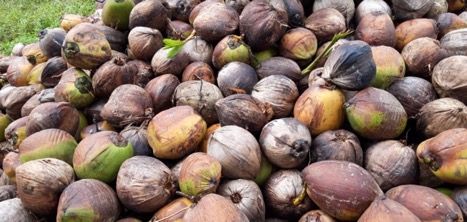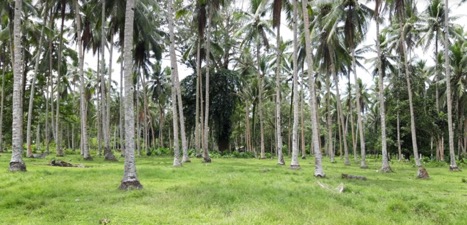The North Maluku region – and West Halmahera in particular – is famous for its abundant supplies of coconuts but few know that coconut waste – in the form of fibre and shells – can help address the lack of electricity in the region. “Based on preliminary analyses, MENTARI calculates that coconut production in West Halmahera can potentially reach around 35 million coconuts annually and the area can generate the equivalent of 3–3.5 MW of electricity. However, more detailed studies are required for a better understanding of the availability and sustainability of the raw materials,” said Sakti Siregar, MENTARI’s biomass consultant.
A report by the Institute for Essential Services Reform published in March 2019, recorded the North Maluku region’s bioenergy potential as up to 35 MW and concluded that biomass power plants have the potential to replace diesel power plants that use fossil fuels. The costs of operating fossil fuel power plants fluctuate with purchase prices and transport costs but once the government issues the new regulations for the renewable energy sector, the electricity tariff from biomass power plants should become increasingly competitive. This will encourage investment and development in renewable energy-based power plant projects.
MENTARI is collaborating with PT Dewa Agri Coco Indonesia (DACI) to further assess this opportunity. Last year, DACI signed an agreement with the West Halmahera district head to build a coconut oil and charcoal factory.
“This project attracts us because the abundant and often wasted coconut fibre and coconut shells can be used as fuel and produce environmentally-friendly electricity. Our support includes an analysis of the availability of raw materials, costs, financial and economic feasibility calculations, and social and environmental impacts. The expected outcome is to improve the technical and financial feasibility of the project and accelerate biomass power plant construction,” said Iwan Adhisaputra, MENTARI’s brokerage leader.
MENTARI plays a crucial role in these projects that contribute to the state electricity company’s efforts to reduce the use of fossil fuels and increase access to renewable energy. The company’s involvement is equally vital since it will fully absorb the electricity generated by this project. Furthermore, the project will increase the electrification ratio, reduce the electricity generation cost and at the same time reduce greenhouse gas emissions in West Halmahera.
West Halmahera district head, James Uang, is a strong supporter of the project and in a meeting with PT DACI and MENTARI in March 2021, he called on regional and village owned enterprises to contribute to these efforts. He suggested, for example, that village-owned enterprises could run a community empowerment program to collect coconut fibres and shells. This program could boost local income as well as empower women and other disadvantaged groups. MENTARI is planning to further explore the role of women and social inclusion in the project.








